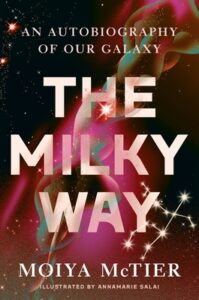To start her new book, The Milky Way: an Autobiography of our Galaxy, Moiya McTier reminisces about her relationship with her “celestial mom and dad” – the Sun and Moon. As a girl in rural Pennsylvania, she felt they watched over her, and she’d speak with them regularly, sharing her news and feelings: “I sought comfort from the Moon well into my adolescence.” 
And no, she’s not an astrologer. She considers herself both an astrophysicist and folklorist (which is probably about as close as you can get) who found “science and myth weren’t as contradictory as they seemed on the surface. Both are tools that we humans use to understand how we fit in with the rest of the universe.” I suspect that McTier represents a new generation of astronomers who don’t find astrology quite as threatening, offensive or absurd as those who came before them. In fact, she goes so far as to have the Milky Way say that “You might think they [astrologers] would annoy me but I like them; they remind me of my sufficiently awestruck ancestors.”
The marvelously organic conceit of the book is that it’s dictated by the Milky Way galaxy itself, who’s charming and pompous at the same time, as well as all-knowing, even admitting that, “consciousness is an inherent quality of the universe.” I loved the idea that a galaxy’s black hole holds their angst and negativity. This is a far cry from the typically materialistic astronomers we’ve come to know.
Dr. McTier mentions lots of sky myths from around the world, as the Milky Way waxes nostalgic for a time when humanity was more connected with the cosmos. Much of the astronomical information is accessible and even entertaining due to the Milky Way’s compelling persona; but some of it was still a bit too technically involved for this astrologer’s taste (reminding me that we, too, have the same problem communicating more detailed astrological analyses to the inexperienced).
They still don’t know exactly what dark matter is, though it comprises over a third of the universe. And there are only about 10,000 astronomers and 1,000 radio astronomers in the world. We exponentially outnumber them, interestingly enough. The Milky Way admits that measuring galactic distances is very derived and indirect, a thought that’s often struck me, too. A defense of astrophysics is that “some sciences are observational in nature, not experimental,” and related critiques have regularly been leveled at astrologers by skeptics.
Often accessible, The Milky Way is a refreshing and informative journey through the history of the cosmos. On her website, McTier says she was born in 1995, giving her the Uranus-Neptune conjunction in Capricorn signature of the times, which perhaps explains her gentler, more inclusive astronomical point of view. It’s notable that Dr. Percy Seymour’s The Scientific Basis of Astrology and Dr. Anthony Aveni’s Conversing with the Planets were both published in 1992, when the Uranus-Neptune conjunction was already nearly exact; both seemed to open the door to broadening views of astrology.
As Moiya McTier has not yet reached her first Saturn return, I’m eager to see where the coming years take her and what other topics she’ll address in the future.
Buy The Milky Way on Amazon.com.
About my reviews and links.
